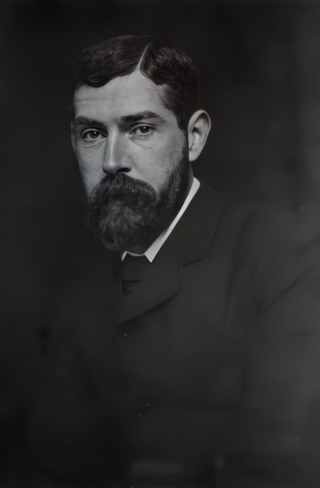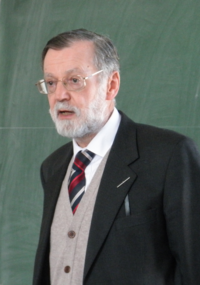The argument from morality is an argument for the existence of God. Arguments from morality tend to be based on moral normativity or moral order. Arguments from moral normativity observe some aspect of morality and argue that God is the best or only explanation for this, concluding that God must exist. Arguments from moral order are based on the asserted need for moral order to exist in the universe. They claim that, for this moral order to exist, God must exist to support it. The argument from morality is noteworthy in that one cannot evaluate the soundness of the argument without attending to almost every important philosophical issue in meta-ethics.
In analytic philosophy, anti-realism is a position which encompasses many varieties such as metaphysical, mathematical, semantic, scientific, moral and epistemic. The term was first articulated by British philosopher Michael Dummett in an argument against a form of realism Dummett saw as 'colorless reductionism'.

Immanuel Kant was a German philosopher and one of the central Enlightenment thinkers. Born in Königsberg, Kant's comprehensive and systematic works in epistemology, metaphysics, ethics, and aesthetics have made him one of the most influential figures in modern Western philosophy.
Truth is the property of being in accord with fact or reality. In everyday language, truth is typically ascribed to things that aim to represent reality or otherwise correspond to it, such as beliefs, propositions, and declarative sentences.

John Henry McDowell, FBA is a South African philosopher, formerly a fellow of University College, Oxford, and now university professor at the University of Pittsburgh. Although he has written on metaphysics, epistemology, ancient philosophy, nature, and meta-ethics, McDowell's most influential work has been in the philosophy of mind and philosophy of language. McDowell was one of three recipients of the 2010 Andrew W. Mellon Foundation's Distinguished Achievement Award, and is a Fellow of both the American Academy of Arts & Sciences and the British Academy.
In moral philosophy, deontological ethics or deontology is the normative ethical theory that the morality of an action should be based on whether that action itself is right or wrong under a series of rules and principles, rather than based on the consequences of the action. It is sometimes described as duty-, obligation-, or rule-based ethics. Deontological ethics is commonly contrasted to consequentialism, virtue ethics, and pragmatic ethics. In this terminology, action is more important than the consequences.

Francis Herbert Bradley was a British idealist philosopher. His most important work was Appearance and Reality (1893).

Transcendental idealism is a philosophical system founded by German philosopher Immanuel Kant in the 18th century. Kant's epistemological program is found throughout his Critique of Pure Reason (1781). By transcendental Kant means that his philosophical approach to knowledge transcends mere consideration of sensory evidence and requires an understanding of the mind's innate modes of processing that sensory evidence.

Nicholas Rescher is a German-American philosopher, polymath, and author, who has been a professor of philosophy at the University of Pittsburgh since 1961. He is chairman of the Center for Philosophy of Science and was formerly chairman of the philosophy department.
Universal prescriptivism is the meta-ethical view that claims that, rather than expressing propositions, ethical sentences function similarly to imperatives which are universalizable—whoever makes a moral judgment is committed to the same judgment in any situation where the same relevant facts pertain.
Philosophical realism is usually not treated as a position of its own but as a stance towards other subject matters. Realism about a certain kind of thing is the thesis that this kind of thing has mind-independent existence, i.e. that it is not just a mere appearance in the eye of the beholder. This includes a number of positions within epistemology and metaphysics which express that a given thing instead exists independently of knowledge, thought, or understanding. This can apply to items such as the physical world, the past and future, other minds, and the self, though may also apply less directly to things such as universals, mathematical truths, moral truths, and thought itself. However, realism may also include various positions which instead reject metaphysical treatments of reality entirely.

The Bounds of Sense: An Essay on Kant’s Critique of Pure Reason is a 1966 book about Immanuel Kant's Critique of Pure Reason (1781) by the Oxford philosopher Peter Strawson, in which the author tries to separate what remains valuable in Kant's work from Kant's transcendental idealism, which he rejects. The work is widely admired, and has received praise from philosophers as one of the first thorough works on the Critique of Pure Reason in the analytic tradition, although Strawson's treatment of transcendental idealism has been criticized.

Ralph Barton Perry was an American philosopher. He was a strident moral idealist who stated in 1909 that, to him, idealism meant "to interpret life consistently with ethical, scientific, and metaphysical truth." Perry's viewpoints on religion stressed the notion that religious thinking possessed legitimacy should it exist within a framework accepting of human reason and social progress.
John Alexander Smith was a British idealist philosopher, who was the Jowett Lecturer of philosophy at Balliol College, Oxford from 1896 to 1910, and Waynflete Professor of Moral and Metaphysical Philosophy, carrying a Fellowship at Magdalen College in the same university, from 1910 to 1936. He was born in Dingwall and died in Oxford.

Kantian ethics refers to a deontological ethical theory developed by German philosopher Immanuel Kant that is based on the notion that: "It is impossible to think of anything at all in the world, or indeed even beyond it, that could be considered good without limitation except a good will." The theory was developed in the context of Enlightenment rationalism. It states that an action can only be moral if (i) it is motivated by a sense of duty and (ii) its maxim may be rationally willed a universal, objective law.

Cartesian doubt is a form of methodological skepticism associated with the writings and methodology of René Descartes. Cartesian doubt is also known as Cartesian skepticism, methodic doubt, methodological skepticism, universal doubt, systematic doubt, or hyperbolic doubt.
In philosophy, objectivity is the concept of truth independent from individual subjectivity. A proposition is considered to have objective truth when its truth conditions are met without bias caused by the mind of a sentient being. Scientific objectivity refers to the ability to judge without partiality or external influence. Objectivity in the moral framework calls for moral codes to be assessed based on the well-being of the people in the society that follow it. Moral objectivity also calls for moral codes to be compared to one another through a set of universal facts and not through subjectivity.

American philosophy is the activity, corpus, and tradition of philosophers affiliated with the United States. The Internet Encyclopedia of Philosophy notes that while it lacks a "core of defining features, American Philosophy can nevertheless be seen as both reflecting and shaping collective American identity over the history of the nation". The philosophy of the Founding Fathers of the United States is largely seen as an extension of the European Enlightenment. A small number of philosophies are known as American in origin, namely pragmatism and transcendentalism, with their most prominent proponents being the philosophers William James and Ralph Waldo Emerson respectively.
Transcendental Humanism in philosophy considers humans as simultaneously the originator of meaning, and subject to a larger ultimate truth that exists beyond the human realm (transcendence). The philosophy suggests that the humanistic approach is guided by “accuracy, truth, discovery, and objectivity” that transcends or exists apart from subjectivity.
Kant is a 1982 book by the English philosopher Roger Scruton, in which the author provides an introduction to Kant's philosophy.l, Heidegger and Wittgenstein among others.









